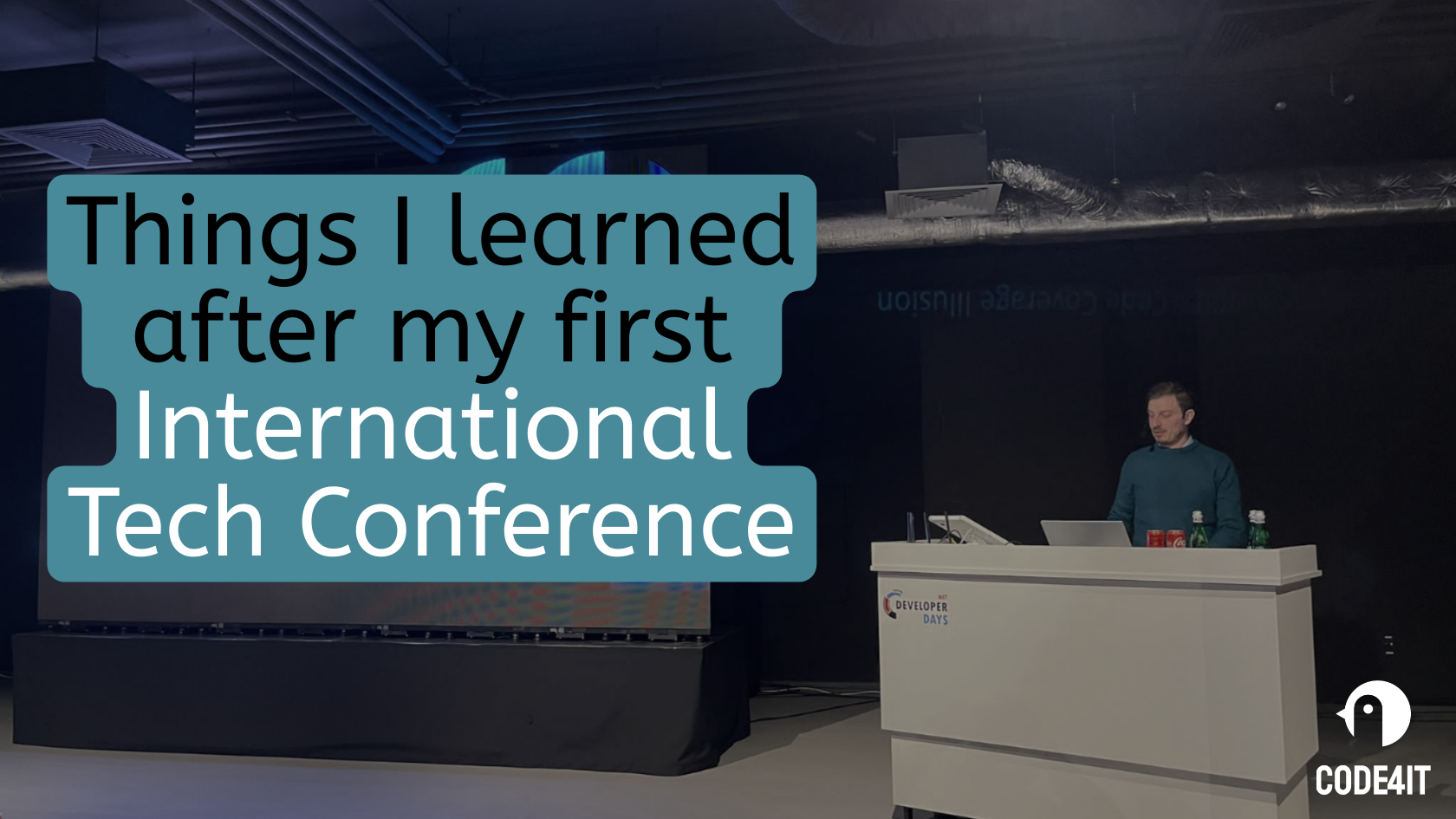Things I learned after speaking at my first Big International Conference
It’s easy to say ‘Public Speaking’. But there are lots of factors that you can (and should) consider when talking to an international audience, especially if English is not your first language.
Table of Contents
Just a second! 🫷
If you are here, it means that you are a software developer. So, you know that storage, networking, and domain management have a cost .
If you want to support this blog, please ensure that you have disabled the adblocker for this site. I configured Google AdSense to show as few ADS as possible - I don't want to bother you with lots of ads, but I still need to add some to pay for the resources for my site.
Thank you for your understanding.
- Davide
In October 2025, I talked for the first time at a big international conference: Dotnet Developer Days 2025 in Warsaw, Poland.
It went quite well - not perfectly, though. But I learned a couple of things that are worth mentioning and can be interesting, first of all for “future me” and then also for everyone who’s going to talk at an international conference in a foreign country (especially if English is not your first language, or something you are fluent with).
Clearly, some of my learnings can also be applied to talks in your native country.
Check video and electricity plug adapters
First and foremost, tip: always check once, twice, and then many other times that you have with you at the conference both the adapter for the laptop charger and the adapter for the video output.
I forgot the adapter for the laptop charger at the hotel, and I started panicking because the laptop was running out of battery.
Luckily, another speaker - Johan - got me covered: he lent me his cable, which, by chance, was compatible with mine.
Considering I had to deliver two talks on the same day, if my laptop had run out of battery, it would have ruined my whole conference experience.
Lesson learned!
Adjust screen, presentation and IDE’s luminosity according to the room structure
Depending on the venue, a conference can have one or more rooms available. And each room can have a different luminosity.
One of the sessions before mine used a light theme for both the slides and the code, but the session took place in a dark room with a very powerful screen.
The result? Everybody got blind!
I was using the light theme for Visual Studio, so I changed it in a couple of seconds.
But I also had to rework a bit the images of my slides, using darker background images.
Here are examples of the changes I made:



Imagine being in a dark room and suddenly seeing that bright, green image! I can hear the audience scream at you!
The lesson here is: take care of your audience by choosing the right colours (and the font size as well, obviously!)
Adjust your session based on the time and the audience count
I was happy with how the session about Code Coverage and the Testing Vial went: the audience appreciated it and asked a couple of interesting questions.
Hey! You’ve never heard of the Testing Vial?? Check it out here! 🧪🧪
But I can’t say the same for the session about what was released in .NET from version 5 to 9.
In this session, I briefly describe a ton of small things that have been released in recent years, such as new data types and syntax formats. So, except for the initial introduction, I generally talk about each topic for a minute or two - how much time should I spend to say «now we have DateOnly, that can replace DateTime if you don’t care about the Time part»?
I delivered it many times during these years, but this is the first time I’m totally unsatisfied with the result.
Why?
Two main factors impacted the delivery:
- It was the last session of the last day: the audience was already tired after two full days of sessions, so the attention span was incredibly low. I can understand them - I was exhausted too.
- There were many more people than the other times I delivered the same session: other times, I used to interact more with the crowd, asking them to join me on stage and run some experiments together, instead of just looking at me jumping from one topic to another. This session used to be much more interactive. But when the crowd gets bigger, nobody wants to be under the spotlight in front of that many people.
So, even if the topic was valuable, the format was not the best for this occasion. I will have to transform it into something different.
But, at least, the idea of creating a poll for the audience to pick the topics we would discuss was appreciated. It sort of kept them awake, but most probably it was not enough.
The lesson here is: tailor your session based on the hour and the expected audience.
Help your brain adapt to the language switch
As you know, I’m Italian. I’ve always lived here, and my company is Italian, with most of my colleagues being Italian too.
It means I don’t have many opportunities to brush up my English skills - and if it weren’t for this blog, it would be even worse.
So, speaking in English is a huge mental effort for me. It’s not something I do every day (well, except for the Daily meeting, so.. 10 minutes every day? surely, not enough).
But, in general, my English skills are not that terrible. At least, not considering my background.
During this trip, I was completely alone, and, even better, there were no Italians among the other conference speakers.
This simple fact forced me to switch my mind to English mode: it was my only way to communicate with others.
But changing such an essential aspect of life - your language - is not immediate. It takes time for the brain to switch and adapt. And I noticed it a lot: the first two days, I could barely join the conversations. But, after 2 or 3 days, my talking looked more fluent.
And I was lucky that both my sessions were on the third day: this way, I had time to let my brain adapt to the new city and the new country. If they were on the second day, my English would’ve been way worse.
On the contrary, in the last couple of days of my stay in Warsaw, even my internal thoughts switched to English - and, as a consequence, when I had to send voice messages to family and friends, it took me a couple of seconds to remember that I should have switched to Italian.
So, the lesson is: if you don’t speak English every day, give your brain some time to adapt by going to the venue city a couple of days before your talks.
Ask the organisers if you can stay a few more days in the city
The world is vast and amazing, and is worth a visit.
If it’s your first time in the venue city and the conference covers your travel and accommodation, ask if you can stay a couple of days longer.
Staying in the city more gives you some benefits, like:
- set your brain to English mode, as described before;
- visit the city: unless you are a very famous and/or talented conference speaker, it is implausible that you will be called again for the same conference (organisers want to have, every year, a different group of speakers). So, get the best out of the travel;
- if the additional days are after the conference, you can get to know the other speakers better. You may end up having dinner, having guided tours of the city, or visiting museums and parks together.
So, just ask. The worst that can happen is that the organiser cannot accommodate your request!
Further readings
It’s been a few years since I’ve been involved in public speaking. I think I learned a couple of things.
I still remember the first time I presented a talk in front of other people: it did not go well. But I learned something:
🔗 Thoughts after my very first public speech | Code4IT
The more I practiced, the more I learned from the experience. Here’s a list of 13 tips for your talks, whether in person or remote:
🔗 13 tips for delivering better tech talks | Code4IT
This article first appeared on Code4IT 🐧
Also, if you are into virtual conferences, you may be interested in this article:
🔗 10 underestimated tasks to do before your next virtual presentation | Code4IT
Wrapping up
Public speaking is a fantastic activity: it’s challenging, but definitely rewarding.
It’s not something like “go on stage and just talk”. It requires effort, a lot of rehearsals, tons of alternative plans in case something goes wrong, and a good balance between ego («hey, I’m on stage!») and humility («hey, I’m on stage FOR YOU»).
Maybe, you can give it a try too!
I hope you enjoyed this article! Let’s keep in touch on LinkedIn, Twitter or BlueSky! 🤜🤛
Happy coding!
🐧


